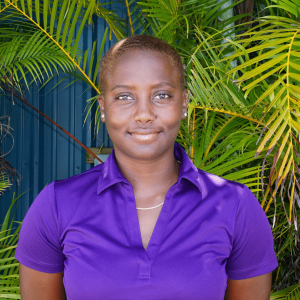From Interns to Leaders: How PIMS is Powering the Next Generation of Ocean Advocates
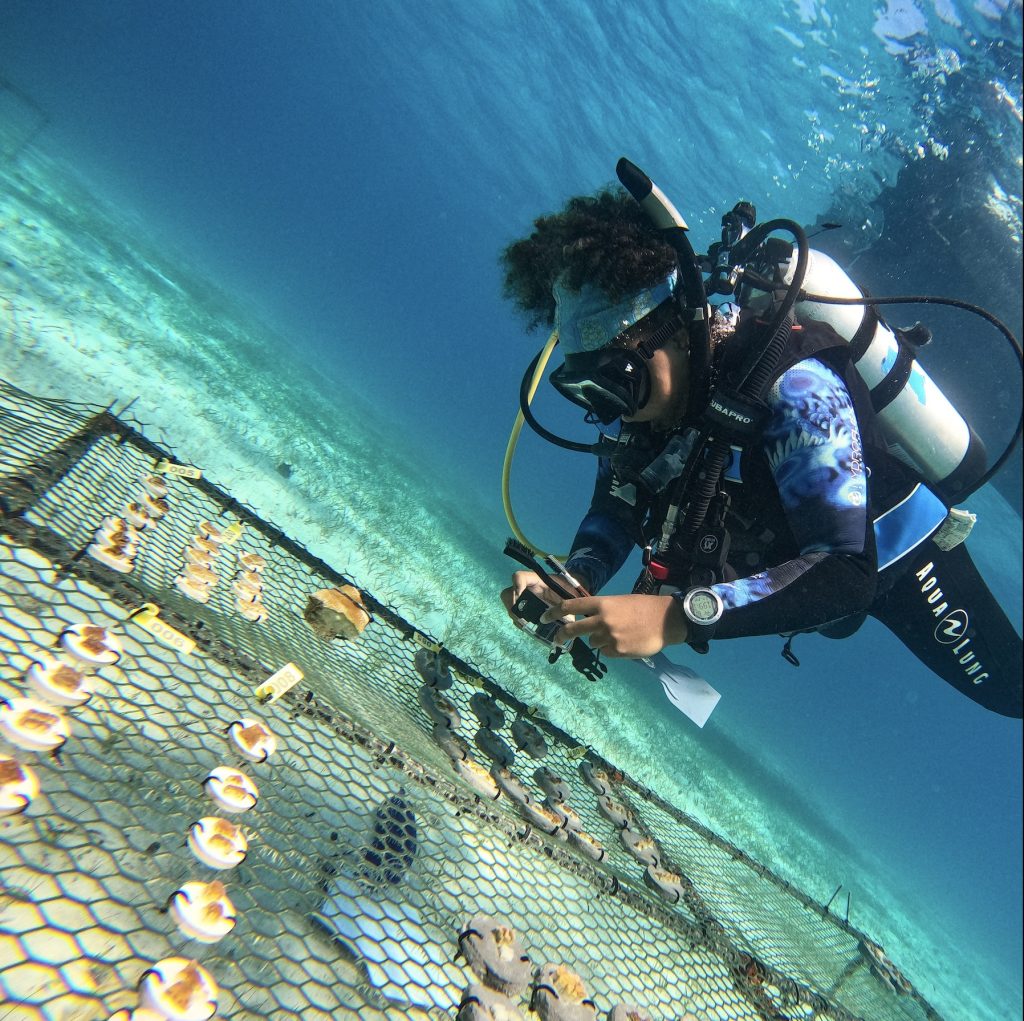
At the Perry Institute for Marine Science (PIMS), we believe that empowering local communities with the skills, knowledge, and experience to lead conservation efforts is key to healing our planet. Whether it’s curious high school students or seasoned professionals, we’re committed to nurturing the next generation of ecosystem advocates.
Over the years, our team has grown not just in size, but in strength and skill — from diving into fieldwork across the region to leading outreach programs and collaborating with government leaders. In this blog, we’re excited to spotlight four young Bahamian voices from our amazing coral team as they share how working with us has shaped their careers, expanded their expertise, and fueled their passion for protecting the environment.
Meghyn Fountain
2021 ➝ 2025
Coral Intern and Advanced Open Water Diver > Research Technician > Coral Team Lead and Divemaster
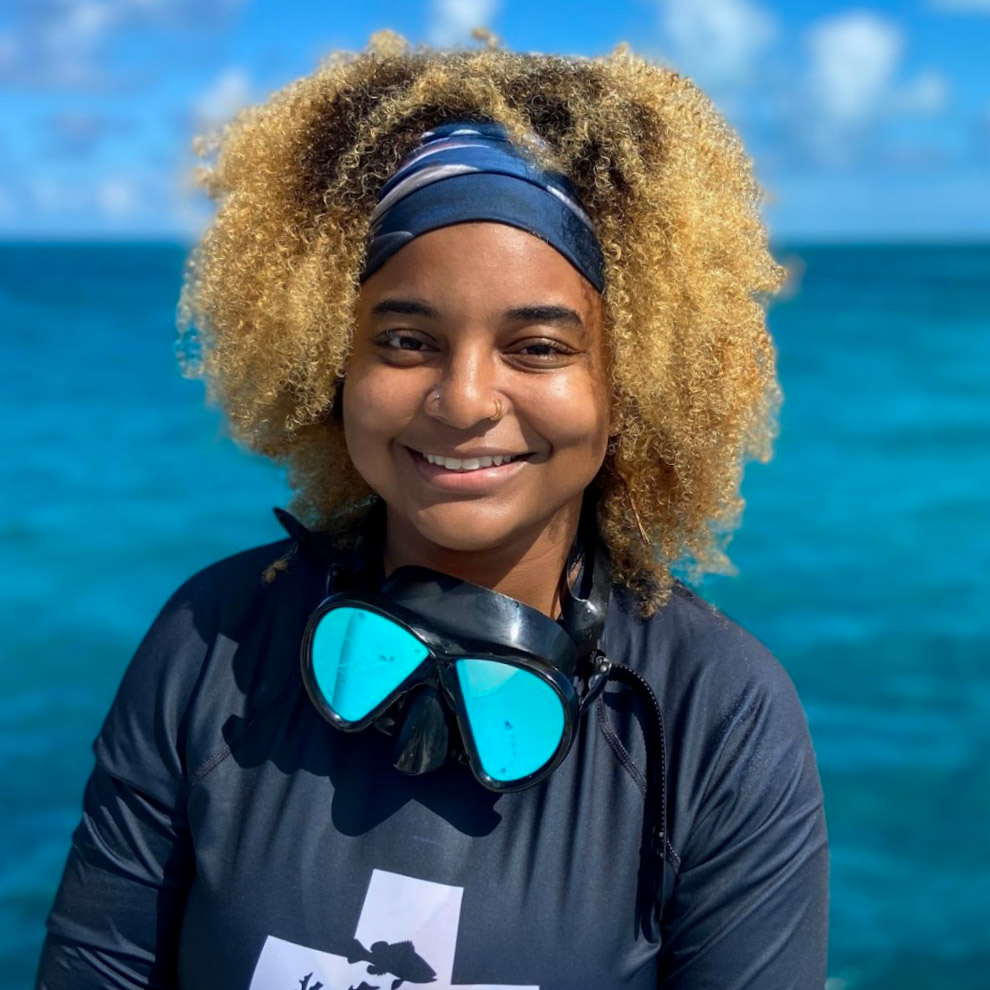
How has PIMS shaped your career goals or future interests in marine science?
Being immersed in hands-on coral conservation, from restoration and stakeholder engagement, has given me a clear sense of how science can directly support ecosystems and communities. Moving forward, I want to pursue a career that blends marine science with program management so I can contribute to both the strategic planning and on-the-ground action.
In what ways has working here helped you grow as a team member or leader?
Through trusting me with real responsibilities, I was given the space to grow which boosted my confidence and helped me transition from being a contributor to someone who can help guide and motivate others. I’ve learned the importance of collaboration, adaptability, and inclusive conservation practices—principles I plan to carry forward in every role I take on.
Why do you think capacity building is important in conservation work, especially in The Bahamas?
It creates lasting, community-driven solutions. In an archipelago like ours, where ecosystems are diverse and widespread, it’s not enough to rely solely on external experts. We need to invest in local knowledge, skills, and leadership to ensure conservation efforts are sustainable and culturally relevant. By empowering Bahamians, especially young scientists, community members, and decision-makers, with the tools and opportunities to lead conservation work, we’re not just protecting ecosystems, we’re strengthening national stewardship. Conservation isn’t something done for communities, but with and by them.
What advice would you give to someone just starting out in this field?
Your passion for the ocean and desire to protect it will carry you through. Remember why you started, stay curious, be open to learning from everyone around you, and don’t be afraid to start small.
“What’s needed now is people who are willing to do the slow, hard work of building a better future—especially in communities on the frontlines of climate change.” — Dr. Ayana Elizabeth Johnson
Kandize McPhee
2021 ➝ 2025
Fisheries Intern and Open Water Diver > CCEA Research Assistant > Coral Technician and Divemaster
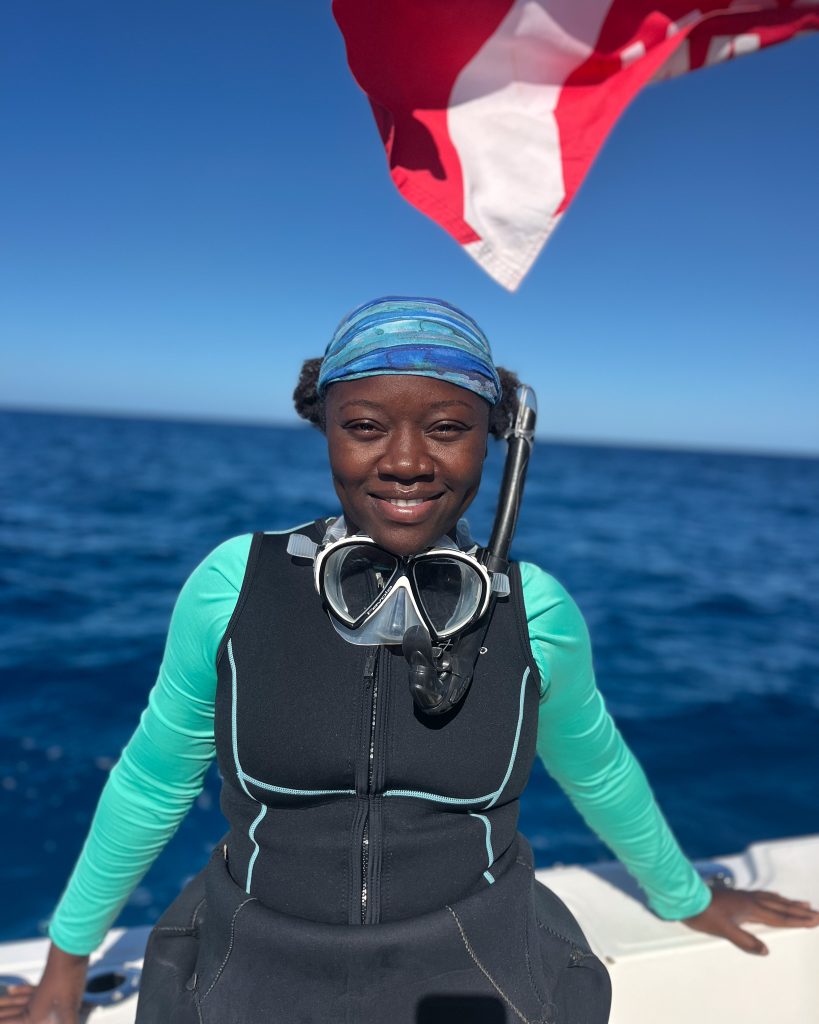
Describe your career journey working with PIMS.
For my two-month summer internship I focused on studying the colonization of Lionfish and the native fish populations within local mangrove habitats. Next with the CCEA, I spoke with community members and fishermen, studying small-scale fishing and the social impacts of the COVID-19 pandemic. Now as a coral technician, I treat coral species vulnerable to Stony Coral Tissue Loss Disease (SCTLD), conduct reef assessments, monitor reefs, and work in coral spawning and restoration activities.
Describe a project or moment when you felt your professional growth really accelerated.
Night diving! The unforgettable experience of watching spawning corals release gamete bundles, collecting them, aiding in fertilization, and monitoring the coral babies for weeks remains my favorite memory.
What advice would you give to someone just starting out in this field?
Never give up! There is a purpose behind your interest in this field, and it is crucial not to allow discouragement from others to deter you from reaching your goals.
“If you are working on something exciting that you care about, you don’t have to be pushed. The vision pulls you.” — Steve Jobs
Taylor Walters
2022 ➝ 2025
Coral Technician and Open Water Diver > Coral Technician and Divemaster
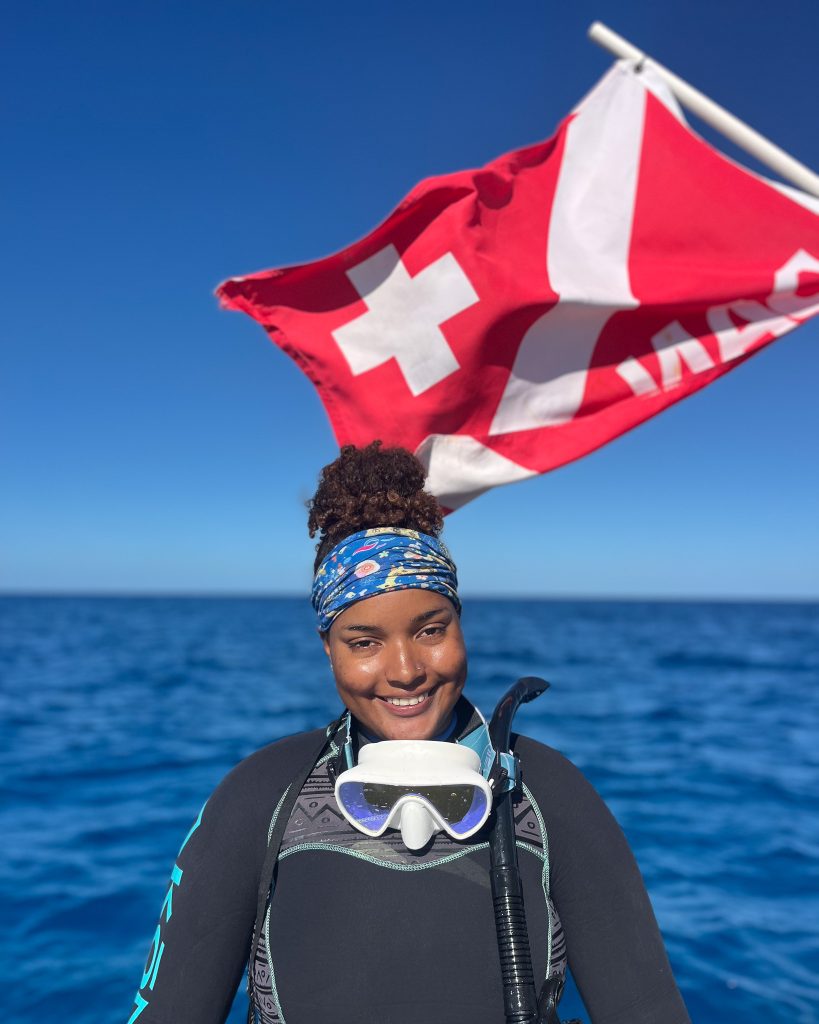
How has PIMS shaped your career goals or future interests in marine science?
Not only has my interest in coral restoration deepened, but my fascination with benthic organisms has also expanded. Through hands-on work, I’ve gained a greater appreciation for the intricate relationships within marine ecosystems.
What challenges did you overcome, and what did you learn from them?
One of the biggest challenges I faced was becoming fully comfortable with salt-water diving, but since working with PIMS, I’ve earned my Advanced Open Water, Rescue Diver, Divemaster certifications and more. Overcoming this challenge not only strengthened my diving skills, but reinforced my adaptability, patience, and problem-solving underwater.
In what ways has working here helped you grow as a team member or leader?
I’ve learned how vital teamwork is in conservation. Trusting my peers and adapting to challenges together has reinforced my ability to work within a team, making every success a collective achievement.
What advice would you give to someone just starting out in this field?
Don’t hesitate to apply for internships or jobs that may not perfectly align with your initial interests. Gaining hands-on field experience can bring unexpected opportunities, broaden your skill set, and even lead you to discover a passion for something you hadn’t even considered.
Describe a project or moment when you felt your professional growth really accelerated.
As lead of the coral microfragmentation project, Taylor was responsible for ensuring coral fragments remained free of algae, hydroids, and any other harmful organisms that could compromise their development.
“The most rewarding part was watching the coral fragments gradually grow and fuse together, transforming into larger colonies.”
Duran Mitchell
2022 ➝ 2025
Coral Technician and Advanced Open Water Diver > Coral Technician and Rescue Diver
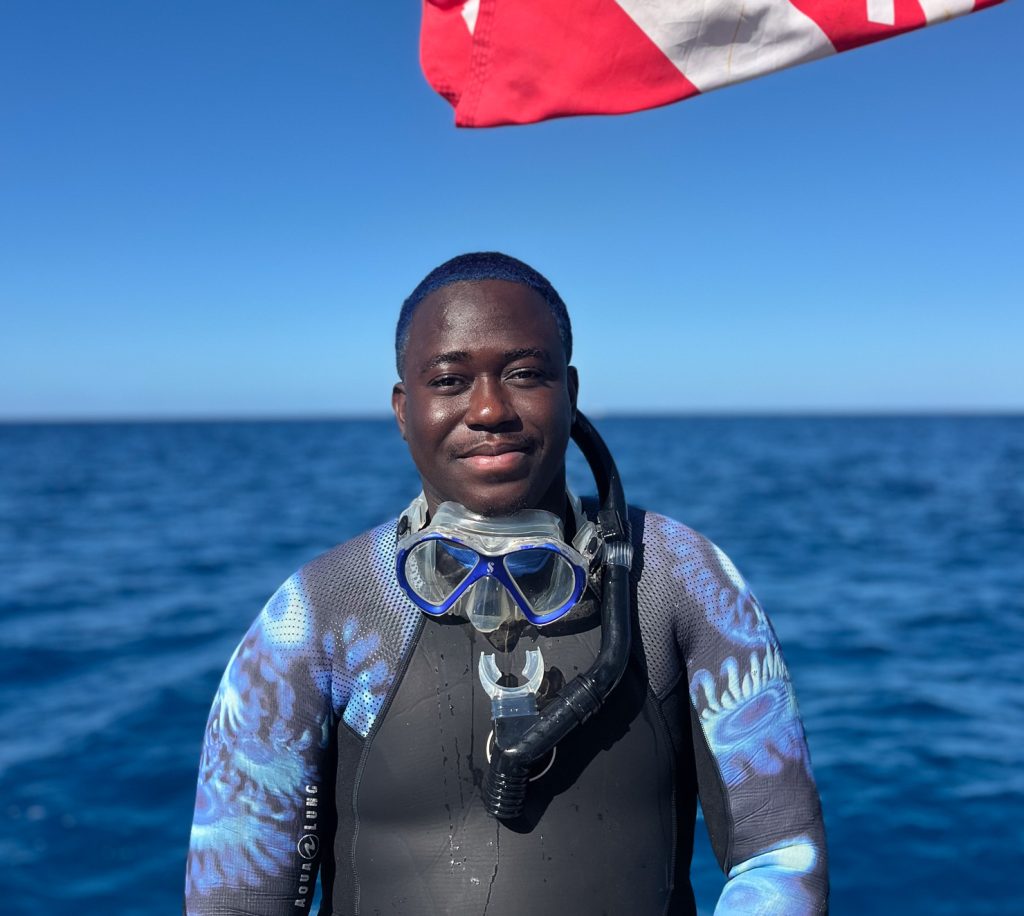
How has PIMS shaped your career goals or future interests in marine science?
My interest in corals and coral restoration was little to none. Previously working as an aquarist, I only cared about fish. Now, as a coral technician, I have a deeper understanding and see the importance of every single organism in the marine ecosystem; they’re all needed for healthy fisheries. Moving forward, I want to learn more about other sea creatures, why they’re important, and how we can help protect and improve our marine ecosystems from all angles.
Why do you think capacity building is important in conservation work, especially in The Bahamas?
Capacity building, especially in Small Island Developing States like The Bahamas, is crucial to empowering locals and gives them the opportunities to better their communities. It gives local communities the necessary skills and knowledge to effectively protect their own environment, which we rely heavily on as a way of life.
What advice would you give to someone just starting out in this field?
Always be open and eager to learn new things. Working in marine conservation every day is a new adventure.
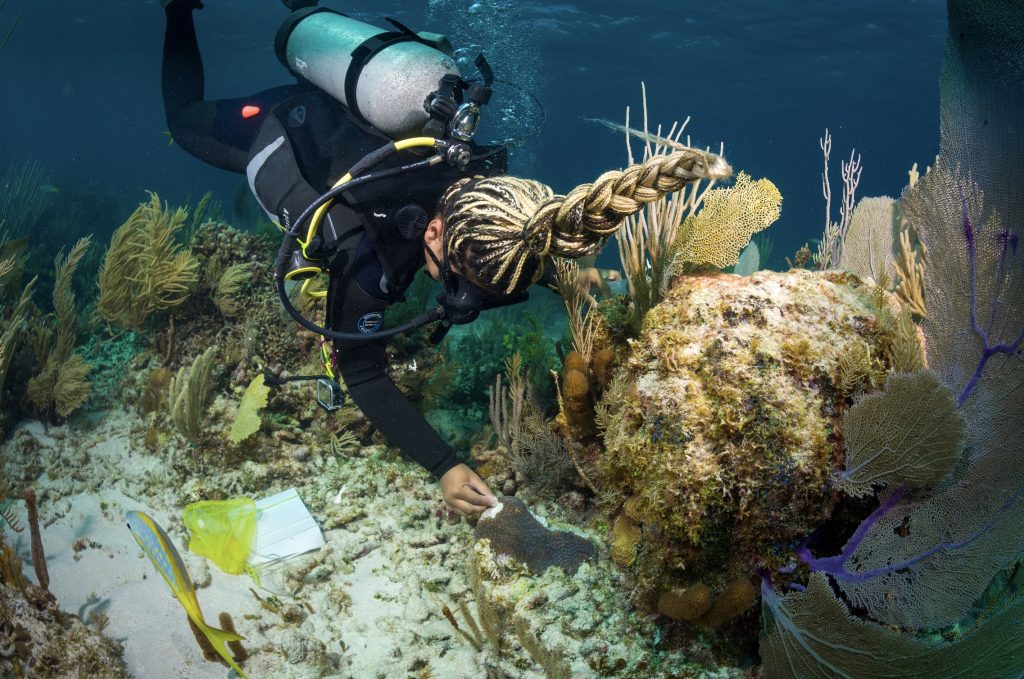
Frequently Asked Questions (FAQ)
What is capacity building in conservation?
Capacity building involves equipping individuals and communities with the skills, knowledge, tools, and resources needed to lead and sustain conservation efforts. At PIMS, this includes training in coral restoration, fisheries research, diving, science communication, and community engagement.
Why is local leadership important in marine science?
Local leadership ensures that conservation efforts are culturally relevant, community-supported, and sustainable. When Bahamians lead the work in their own waters, it builds ownership, resilience, and long-term impact.
Can students or young professionals apply to PIMS programs?
Yes! PIMS offers internships, fellowships, and training opportunities for students and early-career professionals passionate about marine science and conservation. Follow us on [social media] or visit our website to learn about current opportunities.
How can I support this work?
You can support the next generation of ocean leaders by donating, volunteering, or partnering with PIMS. Visit [perryinstitute.org/donate] to make a gift or learn more.
About the Perry Institute for Marine Science (PIMS)
For more than 50 years, Perry Institute for Marine Science (PIMS) has advanced ocean stewardship around the world. Guided by our vision “Thriving Seas, Empowered Communities,” our scientists pair cutting‑edge research with hands-on conservation to protect coral reefs, mangroves, fisheries, and coastal habitats while supporting sustainable livelihoods. We collaborate with governments, NGOs, schools, and forward‑thinking businesses to turn data into action—whether restoring reefs through our Reef Rescue Network, mapping coastal ecosystems with drone and photogrammetry technology, or training the next generation of marine leaders. By discovering solutions, creating opportunities, and inspiring action, PIMS works to ensure a healthy ocean for people and the planet alike. Learn more at www.perryinstitute.org.
Dive Deeper
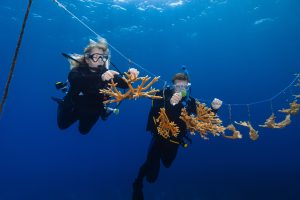
Stream2Sea Coral Care: The World’s First Reef-Positive Sunscreen
Stream2Sea Coral Care: The World’s First Reef-Positive Sunscreen | Perry Institute for Marine Science Conservation Partners Stream2Sea Coral Care: The World’s First Reef-Positive Sunscreen Discover why PIMS has partnered with

Build a Coral Reef for the Holidays | PIMS x Partanna
PIMS is partnering with Partanna to build a 100m² carbon-negative reef. Rick Fox is matching donations up to $25k. Help us build a sanctuary for the future.
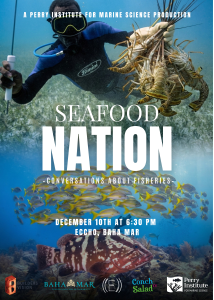
“Seafood Nation” Documentary Premiere Explores the Heart of Bahamian Culture and the Future of Fisheries
NASSAU, The Bahamas | December 5, 2025 – From the bustling stalls of Potter’s Cay to family kitchen tables across the archipelago, seafood is far more than just sustenance in
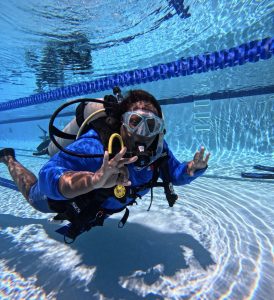
PIMS and Disney Conservation Fund Partner to Train 19 Government Divers
PIMS dive training in Nassau strengthened national coral restoration capacity across government agencies. Bahamas Dive Training Builds National Coral Restoration Capacity Last fall, between the months of September and October,
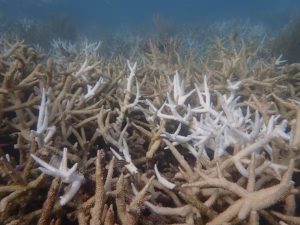
Florida’s Coral Reef Crossed a Line: What Functional Extinction Really Means for Elkhorn and Staghorn Corals
Reefs didn’t just bleach. They functionally vanished in one summer. A new Science study co-authored by researchers from the Perry Institute for Marine Science (PIMS) has found that Florida’s two
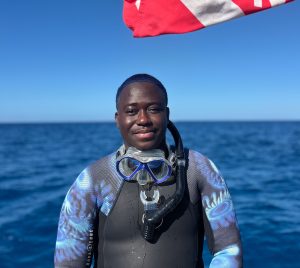
Q&A: Understanding the IDC Course at PIMS with Duran Mitchell
A former aquarist turned coral conservationist, Duran is passionate about understanding how all marine life connects. PIMS & IDC: Empowering New Dive Instructors for Marine Conservation PIMS & IDC: Empowering


